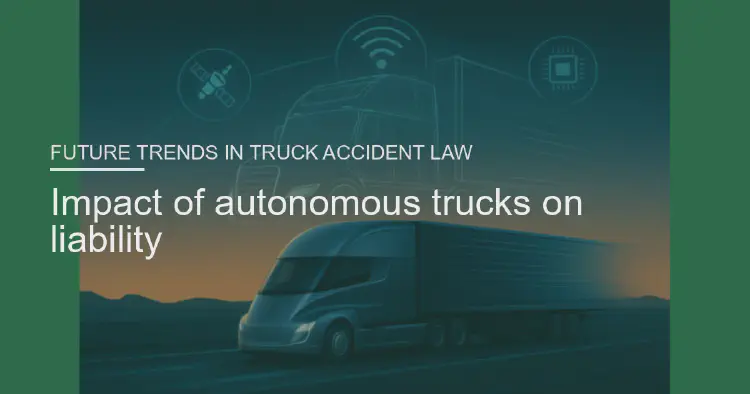Impact of autonomous trucks on liability
As autonomous trucks move closer to widespread use, they raise complex legal questions about who is liable when accidents occur—drivers, trucking companies, manufacturers, or technology providers.
- Truck Accident Law Team
- 2 min read
Article 1 of 6 in Future Trends in Truck Accident Law/

Impact of Autonomous Trucks on Liability in Accident Cases
Shift in Traditional Liability Models
- In human-driven truck accidents, liability typically falls on drivers, trucking companies, or third parties.
- With autonomous trucks, responsibility may shift toward manufacturers, software developers, and technology providers.
Key Liability Questions
- Manufacturer Liability
- If an accident results from a defect in sensors, braking systems, or AI software, product liability law may apply.
- Trucking Company Liability
- Companies may still be liable for improper supervision, maintenance, or misuse of autonomous systems.
- Human Operator Liability
- Many autonomous trucks will still have human operators or remote monitors; their negligence could trigger liability.
- Shared Liability
- Courts may divide fault among manufacturers, trucking companies, and human overseers.
Challenges for the Legal System
- Unclear Regulations: Current FMCSA and state rules assume human drivers.
- Insurance Questions: Traditional auto liability insurance may not cover AI-related risks.
- Evidence Complexity: Black box data will include advanced software logs requiring expert analysis.
Potential Litigation Trends
- Rise in product liability lawsuits against tech and truck manufacturers.
- Increased use of expert testimony in AI systems and autonomous vehicle technology.
- Expanded role of federal and state legislation in defining accountability.
Policy Considerations
- Lawmakers may introduce new liability frameworks specific to autonomous trucking.
- Hybrid models may emerge, combining strict liability for manufacturers with negligence rules for companies and operators.
- Safety and cybersecurity regulations will shape future litigation.
Summary: Autonomous trucks will transform liability in accident cases, shifting focus from drivers to manufacturers, software developers, and trucking companies. Courts, insurers, and lawmakers must adapt to address product liability, shared fault, and evolving safety standards.
You might also like:
- Tags:
- Trucking Companies
- Truck Accidents
- Black Box
- Expert Testimony
- Trucking Company
- Box Data
- Federal State
- Safety Standards
- Autonomous Trucks
- Shared Liability
- Liability Insurance
- Product Liability
- Litigation Summary
- Manufacturer Liability
- Expert Analysis
- Company Liability
- Accidents Liability
- Black Box Data
- Drivers Trucking Companies
- Impact Autonomous Trucks
- Product Liability Law
- Strict Liability Manufacturers
- Manufacturers Trucking Companies
- Trucking Company Liability
- Role Federal State
- Truck Accidents Liability